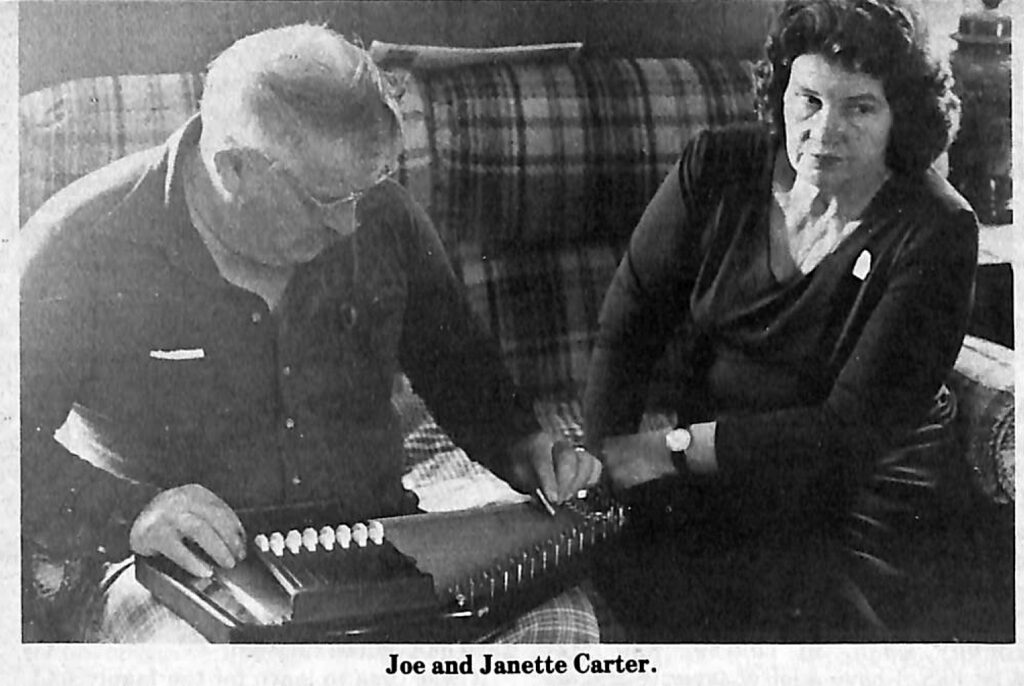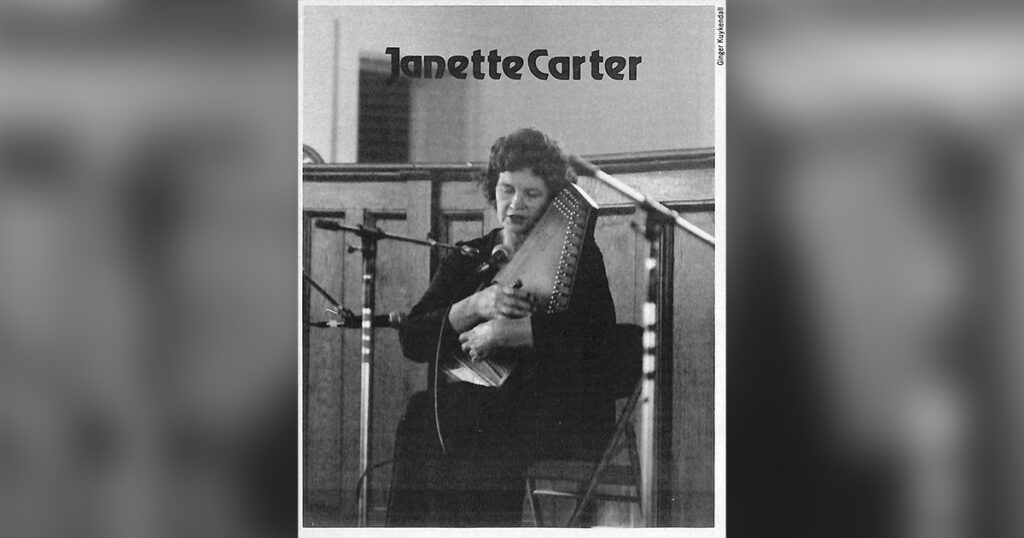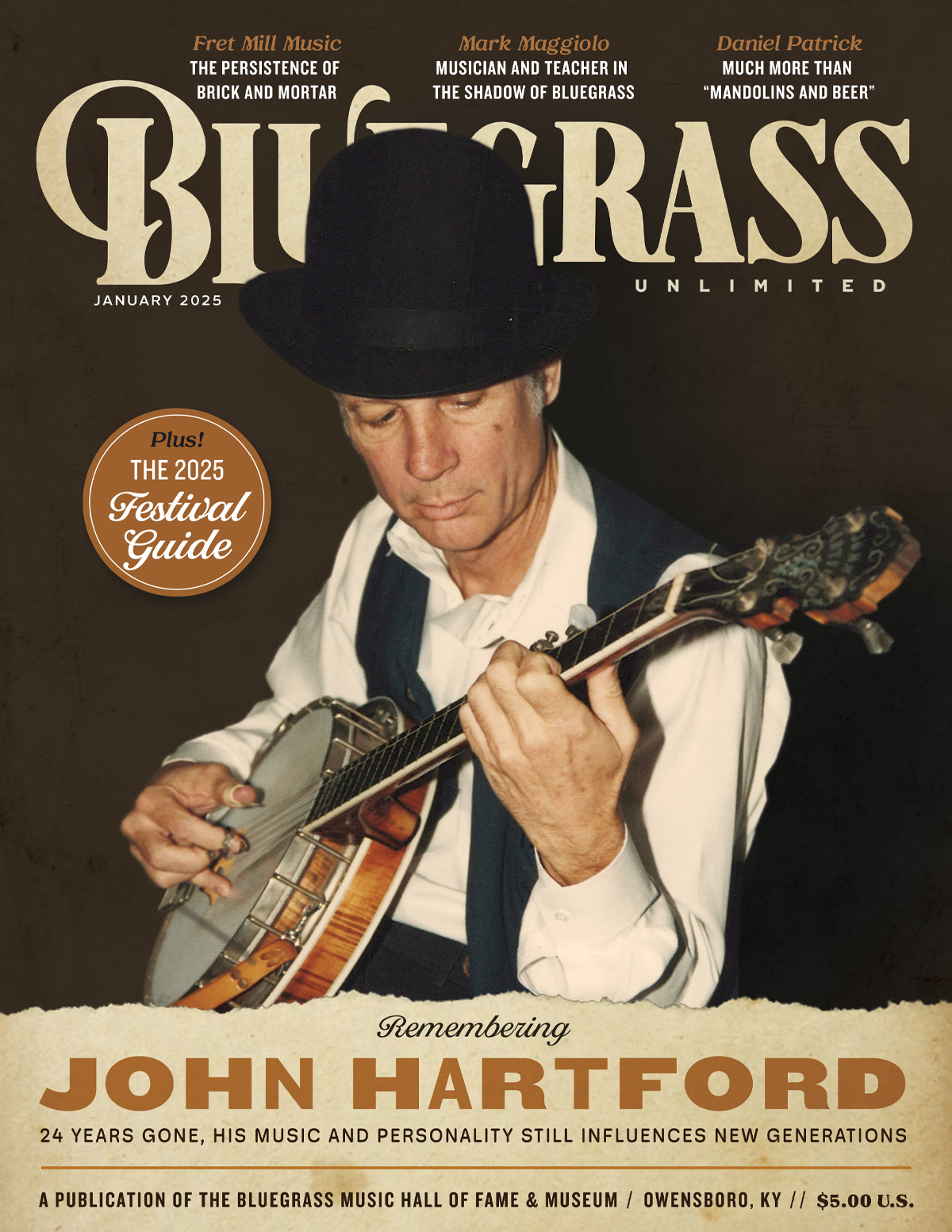Home > Articles > The Archives > Janette Carter
Janette Carter
Reprinted from Bluegrass Unlimited Magazine
February 1979, Volume 13, Number 8
It was spring in the Appalachian mountains. The sun was bright and the air was cool. White dogwood trees were in bloom throughout Kentucky, Tennessee and Virginia. Mountain laurel covered the ground. The foliage was so breath-taking it was hard to imagine that it covered mountains that contained coal mines. Just the thought of a coal mine – which I’ve never seen – seemed ugly so I tried not to think about it. I fell in love with a lavender-flowered bush. It’s called a redbud tree, I was told. Didn’t look red to me… just pink and soft and feminine.
I started to hum “You Are My Flower.” I was off to meet Janette Carter and hear the story of the Carter Family in Janette’s and her brother Joe’s own words. I knew it would be a tale they had repeated many times, to many people. I knew the Carter Family is pure country, mountain music. I knew that many people believed that country music changed when the Carters left the road… I made a pilgrimage to the Clinch Mountain, Poor Valley, to be exact. What I found in Hiltons, Virginia made my life rich.
Janette Carter arrived at her home shortly after I did. She was dressed in a simple, long brown dress – a wooden autoharp pin carved by a fan was her only jewelry, except for a watch, which I felt, didn’t count since it’s functional rather than decorative. She wore no makeup and had just returned from a performance at East Tennessee State College, where she talked a local group into letting her perform ahead of schedule so she could return home to her guests.
I sat in the kitchen as she prepared a feast for the band that was to perform that night at the Carter Family Fold, the oversized general store that resembled a cement gymnasium that holds 800 people and is usually packed on a Saturday night. That evening the Katie Laur Band was appearing – one of Poor Valley’s favorite groups, and Janette’s as well, she said. We all were starved and Janette knew it. She always has enough fixins for hungry musicians. That night it was ham and potato salad, cole slaw, soup beans (the fiddler’s favorite, she remembered), and freshly baked bisquits. Homemade chiffon cake for desert.
“The original Carter Family was A. P. (Alvin Pleasant Delaney, also known as “Doc”), Sara, and Maybelle,” Janette explained. “A. P. and Sara were married – they’re my parents, and Maybelle was mother’s first cousin. She married A. P.’s brother. The Carters started recording in August ’27 in Bristol, Tennessee for Victor. “Bury Me Under the Weeping Willow” was one of six songs recorded that day.
“They were discovered by Ralph Peer, a Victor man from New York City and he came down to try to find artists. I don’t know how many he tried but they selected the Carter Family and Jimmy Rodgers. I was four years old at the time,” Janette said.
“I remember the music clearly because every six months they had to record another session. They always had to compose their own or find people on their personal appearances who could complete the words to the songs they only knew partially. So they usually recorded six or eight songs each session – some 300 songs in all. They’d go to different places – New York, Chicago, Atlanta, even to New Jersey – they’d go wherever Ralph Peer told them to go.
“Back then they didn’t get much royalty money on their records,” Janette pointed out. “One-half cent for each record sold, although they were among the first musicians to put out commercial records. Their first song was “Single Girl, Married Girl.” Back then they did what was called ‘entertainments’ at schools, churches, movie theatres and when I was six years old I started dancing with them – the Charleston, another one called ‘hitting the back step’ – just buck and hoedown dancing.
“Daddy went to schools for jobs and the school would take 70 percent of the money collected at the door and the Carter Family got 30 percent. Times were poor. Admission was 25 cents for adults, maybe 10 cents for kids. We played in Kentucky and Tennessee, Virginia, North Carolina and South Carolina. Times were hard.
“Then the Carter Family went to Texas in the late 30’s to work for Consolidated Drugs and made transcriptions and put on 30 minute shows in border towns along the river between Texas and Mexico. The stations were 100,000 watts or more and the Carter Family music was heard throughout the West. The first year all the shows were made in person.
“Meanwhile,” Janette continues – offering a verbal sidebar – “I worked one year when I was 16 as a solo singer. I got married the first time. Helen, June and Anita – Maybelle’s daughters – were singing as a trio out of Nashville. Maybelle and her daughters worked together in Richmond, then Mississippi and then Nashville. When the family broke up, me and my mom and dad, and brother Joe, recorded for Acme in ’56.” “Technically,” she recalls, “they weren’t good records. The singing was good but the record quality was poor. About ’65 I started working solo at colleges and festivals and schools, occasionally with my brother Joe.
“I play autoharp and Joe plays guitar,” Janette explains for the benefit of folks who aren’t too sure just what she does, “and in ’74 we started our music shows.” The shows are the biggest Saturday night event in the county and were first held in the little store next to the Carter Family Fold building.
“The crowds got so large everyone couldn’t get in, so we made the original store into a museum of Carter Family memorabilia and we built the present facility to hold 800,” Janette said. “We average 350 people each Saturday night, occasionally 700. The Katie Laur Band and the Hotmud Family always draw over 500 adults (that particular evening Katie’s group had over 700 paid admissions), plus children. Each year we have a festival in August and after the festival we can count on adding about 100 people regularly to our Saturday night audiences. After this summer’s festival we’ll probably draw almost 500 people each week, and more when the most popular bands appear.”
Janette changes the subject, again, and asks to talk about her children – Donald William, Rita Janette, and James Delaney, known as Dale. “I have beautiful children,” she says, smiling.
“I didn’t go on the road when the children were small. I worked in schools and in restaurants before I threw up my hands and quit and returned to music. But I’m glad I devoted my years to my children, but now that they’re grown I owe myself something and that’s my music.

“People always ask me why I don’t sing more often at the store on Saturday nights and I tell them that just ’cause I can get up and sing doesn’t mean I am going to get up and sing.” That night, however, she and Joe did a couple of Carter Family numbers and promised the audience that on Saturday night soon she and Joe would spend the evening doing Carter Family material. The audience cheered.
“I run a clean show – no drinking, no drugs, no disorder. I insist that my bands don’t have dirty jokes in their material and I want everyone who comes to put on the best shows they can. The only time we allow electric instruments is for benefit shows.” Janette says she could make more money if she allowed electric bands to perform, but explained, “I want to keep alive the music my mom, dad and Maybelle had. They didn’t even have mikes. I feel anyone can make a racket on an electric guitar and make it sound like something.”
We stop to eat and when our hunger pains subsided Janette returned to her talk of the original Carter Family. “Joe’s the baby and our older sister, Gladys, did the babysitting while mom and dad and Maybelle were on the road.” By this time, the Saturday night performance was due to start in 90 minutes and Joe had walked up to Janette’s house to check on things, to talk and to pick.
“Back when I was little I didn’t pay much attention to the music,” Joe said. “I actually cut my teeth on old 78s and I was born the year the Carter Family started. I was nine months old and crying all the time. I don’t recall my mom and dad taking me with them much. Gladys took care of me. I was so mean not many people fooled with me.
A hefty man today, Joe attributes his size to being nursed by all of the wet mothers in the county while his parents were on the road.
“At times I got sick of the music,” he claimed. “Back in the early 30’s there was very little money and if the folks came back with $12 or $14 per night for the three of them they were doing great. But then, it seems like no one had any money.
“Around ’41 or ’42 the Carter Family performed their last original work, in Charlotte. Their last recording date ended country music as we knew it, although some people argue that point and feel the music ended with Hank Williams’ death.
“I always felt like the son of famous people and I took it all for granted, but now that I look back on it the times were great. We never had special privileges. I don’t guess we have any now either, except we still get royalties from the songs. I don’t have all of their albums – although some kind people have sent us original Carter Family records for the museum – but I do have all their songs on tapes. But when it comes to the old 78s we have as few as anybody.
Janette says she has 40 of them, and knows of a fan in Pennsylvania who bought $800 worth of old Carter albums.
Janette remembers some more. “Maybelle always had a housekeeper. Sometimes when they drove us kids along when they recorded, we were told to sit on a chair and be quiet while they rehearsed. And, believe me, we just sat there and were quiet.”
“It was a rough life and any musician who gets anywhere has had a tough road to hoe,” Joe said.
Today both Janette and Joe write and record together (for Birch, Traditional and County records). “Joe’s songs are in Johnny Cash’s style,” Janette said, “and mine are more inclined to be in the old Carter Family tradition.”
Although she prefers to stay on Clinch Mountain, “Wherever they want me I’ll go… to New York, New Orleans, Washington and Canada. In the summer I’m away quite a bit – maybe seven trips – and I usually drive where I’m going but once in a while I’ll fly, even though I’m scared to death.
“I love Katie Laur, I love Willie Nelson, Johnny Cash, of course, and Mac Wiseman. I have a lot of favorite singers and I like other music like Beatles’ hymns (‘Let It Be,’ for one) and ‘Lara’s Theme.’ I’m trying to preserve one kind of music but that don’t mean I don’t like the others.”
In addition to performing her music Janette said she still has a lot of work to do on the museum. “It’ll take years to do all I want to do. I want to copy down the words to all the Carter Family songs, collect every record. I have every album released by Carter children and grandchildren.”
She realizes she can’t do it by herself. “So far everyone has been very kind. People have given me records and clippings. A woman today gave me a postcard with a picture on it of the Carter Family when they worked in Texas.” She stops talking. Her friends in the living room are silent and wait for her to continue.
“My parents didn’t get much publicity then like they do now. A lot of people come to talk to us about the Carter Family.
“They never realized they were paving the way for others in music. They played for bread money and they originated a style and there was no one ahead of them. My dad had the drive and the push. He’d keep telling mom and Maybelle to hang in and it would get better. If it hadn’t they’d have quit before they did.”
It was time to leave for the family fold to hear the night’s performance. There wasn’t an empty seat and people came from as far away as Pennsylvania, Michigan and Nashville. Janette and I took a walk after the first set to get a cup of coffee.
We were in the back of the old store. “I adored my Dad and it hurts me to think of how many people took advantage of him,” Janette said. She didn’t name names and I didn’t feel it was my business to ask. “You know, I can’t spend too much time thinking about it, though. I have a music to preserve.”

